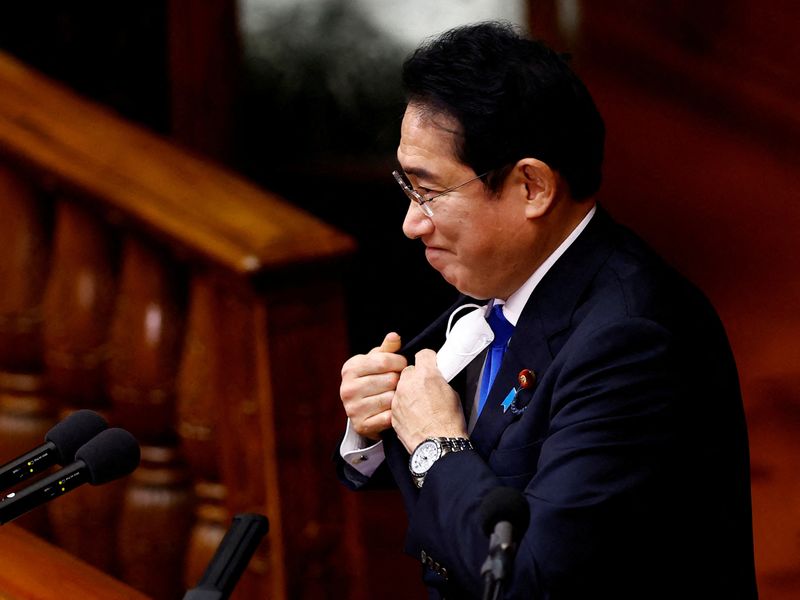By Leika Kihara
TOKYO (Reuters) - Japanese Prime Minister Fumio Kishida said the new central bank governor must have strong communication skills and be able to closely coordinate with global peers, offering his most explicit comment to date on his preference for the top job.
Speaking in parliament, Kishida said on Wednesday he was still in the process of selecting the successor to incumbent BOJ Governor Haruhiko Kuroda, whose term ends in April, noting "the impact the decision would have on financial markets."
While Kishida did not name any potential candidates for the job, some central bank watchers say his comments suggest he has not ruled out Hiroshi Nakaso, a former BOJ deputy governor with international experience, previously thought to have pulled out of the race.
"Since the Lehman crisis, close coordination among major central bank leaders, as well as the ability to receive and deliver high-quality communication to and from domestic and overseas markets, have become extremely important," Kishida said.
"I'd like to select (the next BOJ governor) taking these factors into account," Kishida said, when asked by an opposition lawmaker what the qualifications Kuroda's successor must have.
Markets are closely watching the appointment of the new BOJ governor for clues on how quickly the central bank could phase out its massive stimulus.
Up till now, Kishida had stayed mum on key qualifications for the BOJ leadership position, saying only he would choose the person best suited for the role.
His remarks came in the wake of a report by Nikkei newspaper on Monday that the government has sounded out BOJ Deputy Governor Masayoshi Amamiya to succeed Kuroda.
A career central banker who has drafted many of the BOJ's monetary easing tools, Amamiya is seen by markets as a top contender. However, his experience is focused on domestic monetary policy matters, rather than international affairs.
"It sounded as if Kishida had someone else in mind besides Amamiya, though he's probably still a strong candidate," said Izuru Kato, chief economist at Totan Research.
Among other key contenders, Nakaso has long experience overseeing the BOJ's market operations and international affairs.
"Nakaso fits perfectly with what Kishida laid out as key qualifications, such as his fluent English and strong contacts with overseas central bankers," said Nobuyasu Atago, a former BOJ official who is now chief economist at Ichiyoshi Securities.
As head of the BOJ's financial markets department, Nakaso worked with overseas counterparts in managing the global financial crisis after the collapse of Lehman Brothers in 2008.
Nakaso said last week he has taken up a post heading an Asia-Pacific Economic Cooperation (APEC) advisory council, a comment that led some market players to bet he had dropped out from the central bank leadership race.
The government is considering presenting to parliament its nominees for next BOJ governor and two deputy governors next week, sources told Reuters.

The government's nomination needs the approval of both houses of parliament, making it effectively a done deal since the ruling coalition holds solid majorities in both chambers.
Kuroda's second, five-year term ends on April 8. His two deputies, Amamiya and Masazumi Wakatabe, will see their terms end on March 19.